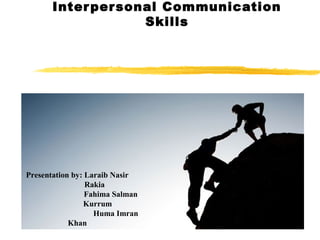
Team work
- 1. Inter per sonal Communication Skills Presentation by: Laraib Nasir Rakia Fahima Salman Kurrum Huma Imran Khan
- 2. What is the difference between Group and a team?
- 3. Are people in a cinema a team or a crowd? A common purpose but not a team because no connection amongst them 3
- 4. A group is a collection A team is a formal work of people who work group who works together together but not to achieve a common working collectively purpose or a goal. towards the same goal 4
- 5. What is needed? 5
- 6. Why do we need a Leadership?
- 7. Why Teams? Benefits of Teams Increase creativity, problem solving and innovation. Higher – quality decision. Improved processes. Global competitiveness. Increase quality. Improve communication. Reduce turnover and absenteeism and increase employee morale.
- 8. Self – Limiting Team Behaviour Groupthink. Group hate. Social Loafing/ Free Riding. Risky Shift.
- 9. Dealing with problem team members Absentee members: Member gets distracted by a work or personal problem that prevents him from commitments made to the team.
- 10. Dealing with problem team members Social Loafer: The tendency for group members to exert less individual effort on an additive task as the size of the group increases.
- 11. Dealing with problem team members Procrastinators: The tendency is to “put off until tomorrow what we should be working on today”.
- 12. Types of Teams Cross Functional Teams Self Managed Teams Task Force Process Improvement Teams Virtual Teams
- 13. What are the Four Stages of Team Development? Forming Storming Norming Performing Every effective team goes through these life cycle stages
- 14. Forming Team members are introduced and begin getting to know each other Goals and tasks are established Generally polite behavior among members Norms are not understood
- 15. Storming Members are sizing each other up and may feel more comfortable and voice their views Members may compete for team roles May argue about goals or how they should be accomplished May choose sides against other members
- 16. Norming Once issues are resolved, agreement occurs around team norms and expectations Trust and common interests are developing Roles and objectives are clarified and understood
- 17. Performing Members make contributions and are motivated by results Leadership is shared according to members’ knowledge and skills Norms and culture are well understood Tasks get accomplished effectively and efficiently
- 18. interdependency Stage 4 effective Stage 3 team Performing $ e tim sharing cohesion r ve group so Relations Norming § es Stage 2 en iv fractioned ct fe group ef conflict Storming p ou gr Stage 1 g in as immature group re dependency ? c In Forming Task Increased Orientation Organization Problem data-flow to task for task solving achieve task
- 19. Characteristics of High – Performance Teams Common purpose and goals. Intention. Clear Roles. Communication Processes. Accepting and Supporting Leadership.
- 20. Characteristics of High – Performance Teams High level of technical and interpersonal skills. Open relationship and trust. Small Size. Accountability. Rewards Structures
- 21. Tips for Effective Teams Be focused. Handle conflict directly. Focus both process and content. Actively participate. Keep sensitive issues private. Communicate openly and positively. Energize the team.
- 22. Tips for Effective Teams Take time to establish operating guidelines. Monitor what’s going on with the team. Practice giving and receiving effective feedback. Work with underperformers. Be reliable and conscientious. When needed, give direction to the team’s work. Be supportive of your team members.
- 24. Team Learning Build relationships to accomplish task Commitment and mutual accountability Team may be confrontational over issues Continuous improvement process How team resolves conflict How the team handles diversity Harness team creativity
- 25. Team Transformation Results are produced from team activities Innovative To sustain energy, must stress and press the team Needs new challenges, new members, new tasks, new relationships or…...
- 26. Team Values Commitment to task and team members Accountability Lead to trust between team members
- 27. Team Rituals How to add new members How to provide information to new members How a member exits Work rituals How the team celebrates!
Notas del editor
- 12
